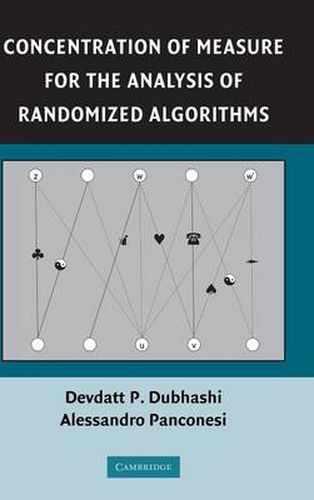Readings Newsletter
Become a Readings Member to make your shopping experience even easier.
Sign in or sign up for free!
You’re not far away from qualifying for FREE standard shipping within Australia
You’ve qualified for FREE standard shipping within Australia
The cart is loading…






Randomized algorithms have become a central part of the algorithms curriculum, based on their increasingly widespread use in modern applications. This book presents a coherent and unified treatment of probabilistic techniques for obtaining high probability estimates on the performance of randomized algorithms. It covers the basic toolkit from the Chernoff-Hoeffding bounds to more sophisticated techniques like martingales and isoperimetric inequalities, as well as some recent developments like Talagrand’s inequality, transportation cost inequalities and log-Sobolev inequalities. Along the way, variations on the basic theme are examined, such as Chernoff-Hoeffding bounds in dependent settings. The authors emphasise comparative study of the different methods, highlighting respective strengths and weaknesses in concrete example applications. The exposition is tailored to discrete settings sufficient for the analysis of algorithms, avoiding unnecessary measure-theoretic details, thus making the book accessible to computer scientists as well as probabilists and discrete mathematicians.
$9.00 standard shipping within Australia
FREE standard shipping within Australia for orders over $100.00
Express & International shipping calculated at checkout
Randomized algorithms have become a central part of the algorithms curriculum, based on their increasingly widespread use in modern applications. This book presents a coherent and unified treatment of probabilistic techniques for obtaining high probability estimates on the performance of randomized algorithms. It covers the basic toolkit from the Chernoff-Hoeffding bounds to more sophisticated techniques like martingales and isoperimetric inequalities, as well as some recent developments like Talagrand’s inequality, transportation cost inequalities and log-Sobolev inequalities. Along the way, variations on the basic theme are examined, such as Chernoff-Hoeffding bounds in dependent settings. The authors emphasise comparative study of the different methods, highlighting respective strengths and weaknesses in concrete example applications. The exposition is tailored to discrete settings sufficient for the analysis of algorithms, avoiding unnecessary measure-theoretic details, thus making the book accessible to computer scientists as well as probabilists and discrete mathematicians.